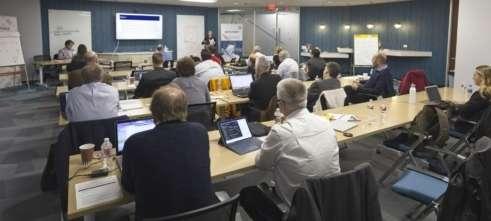
Member Work Groups
Work Groups are for Energistics Consortium members only.
- Not a member? Find out how to join the Energistics Consortium.
- If you are a member and need access to a Work Group collaboration site, see Energistics Consortium Onboarding.
Introduction
- Work Groups define and develop the Energistics standards.
- Work Groups include representatives of member companies focused on a function, subject or topic in a functional area.
- Work Groups produce sets of agreed-upon best practices, recommendations and standards.
- Work Groups build communities of subject matter experts and interested parties around industry standards.
Objectives
Each Work Group has the same general objectives for its given domain or discipline: to set direction, drive issues and promote use of the standards. The Work Group guides the evolution of standards through the development and prioritization of use cases which are then worked by technical experts.
The Work Groups also:
- Promote the adoption and use of standards by sharing experiences and lessons learned.
- Define additional objectives, specific to their domain area.
- Include one or more sub work groups as needed to address specific issues.
Active Work Groups
There are four active Work Groups. Each Work Group maintains a collaboration site which is the repository for working documentation, project plans, discussions, team rosters, etc. Authorized Work Group members will be provided access to the required collaboration sites.
1. WITSML Work Group – Drilling, Completions and Interventions
The WITSML Work Group is the longest-standing and most active. As a result, the WITSML standard has exceeded 85% adoption in the industry and is recognized as a mission-critical component of deviated drilling, geosteering, remote drilling operation control and monitoring and many other applications. The WITSML standard is also used to transfer data between repositories, to share data with partners and government agencies, and to archive the events related to drilling a well so that analytics can be applied to the data.
2. RESQML Work Group – Reservoir Model and Interpretation
The RESQML Work Group addresses the need to work on reservoir models with different software systems. Making sure that the data retains its detail and metadata requires coordination between software development companies to address the use-cases described by operators and service companies. The universal nature of this Work Group standard also opens the door to new software products by lowering the cost of integration to existing platforms.
3. PRODML Work Group – Production Data
The PRODML Work Group is working on realistically transferring the data from tens of thousands of sensors equipping a digital oilfield at high frequencies of measurement. The data is used to compile production volumes as well monitoring production equipment so as to anticipate maintenance needs
4. Common Technical Architecture
Members of the Work Groups have contributed to the development of common standards for Units of Measure (UOM) and metadata (Energy Industry Profile – EIP) that ensure that data is correctly referenced and qualified by subsequent users without recourse to any external information.
For more information and to enquire about joining one or more Work Groups, contact us here.